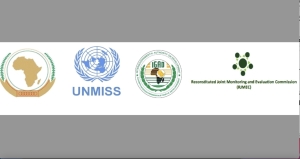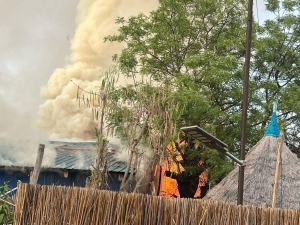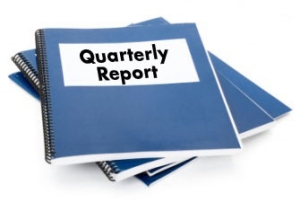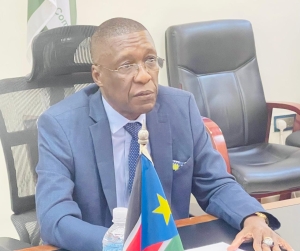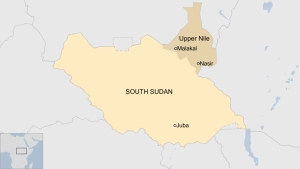OPENING REMARKS BY AMB. BERHANU KEBEDE RJMEC CHIEF OF STAFF DELIVERED AT THE WORKSHOP ON WOMEN’S LEADERSHIP IN THE CONSTITUTION-MAKING PROCESS IN SOUTH SUDAN 13 MAY 2025 JUBA, SOUTH SUDAN
• Hon. Esther Ikere Eluzai, Undersecretary Ministry of Gender, Child and Social Welfare
• Mr. Guang Cong, Deputy Special Representative of the Secretary-General of the UN
• Ms. Delphine Serumaga, Country Representative of the UN Women South Sudan
• Hon. Dr. Riang Yer Zuor, Chairperson of the National Constitutional Review Commission,
• Distinguished Guests,
• Ladies and Gentlemen,
1. It an honor to address you all at this important workshop dedicate to discuss on how to enhance the active role of women’s leadership in the constitution-making process in the Republic of South Sudan.
2. This meeting comes at a very climactic moment in South Sudan’s transitional period– a moment that calls for bold and farsighted leadership, cessation of hostilities, des-escalation of violence, inclusive political dialogue, and reconstitution of Agreement implementing mechanisms to ensure a return to full implementation of the Revitalized Peace Agreement.
3. The ongoing hostilities in some areas of the country raise concerns regarding the commitment of the Parties to the R-ARCSS and whether they are going to accomplish the pending tasks of the R-ARCSS to usher in the country towards its first post-independent democratic elections in December 2026.
4. As RJMEC, we have been engaging with various national, regional and international interlocutors in a bid to prevent violence, de-escalate the ongoing tension, and to appeal for an inclusive political dialogue as the way forward. Consequently, the swift efforts of the regional leaders, envoys, the IGAD Summit, AU Peace and Security Council, the AU Panel of the Wise, the joint IGAD Deputy Executive Secretary and the AU Commission Chairperson’s solidarity mission to South Sudan, the United Nations general efforts were a demonstration of the regional and international community commitment towards the South Sudan peace process.
5. Time is of the essence if we are to collectively deliver elections as scheduled. One of the critical pending tasks for elections is the making of the permanent constitution, which require full participation of the whole spectrum of South Sudanese society in which the role of women should be recognized as of paramount importance.
6. Women’s participation in constitution making is not simply a matter of policy preference; it is a fundamental right, enshrined in international treaties such as the Convention on the Elimination of All Forms of Discrimination Against Women (CEDAW) and the Maputo Protocol. These instruments affirm that women must have an equal voice in shaping the laws and institutions that govern their lives.
7. In South Sudan, the need for women’s leadership in constitution making is even more urgent. South Sudan’s history of conflict has left deep scars, and women have borne unique and disproportionate brunt – from displacement and loss of livelihoods to conflict related sexual and gender-based violence as well as exclusion from decision-making. Ensuring women’s meaningful participation is therefore not only a legal obligation, but also a critical step toward finding lasting solutions to the challenges which the country faces.
8. The Revitalized Agreement on the Resolution of the Conflict in the Republic of South Sudan (R-ARCSS) recognizes this imperative. As you may be aware, the Agreement includes specific gender provisions to support women’s effective participation at every stage of the constitution-making process.
9. Of particular significance are the Women’s Empowerment Bill, which aims to provide a robust legal framework for women’s participation, and the Women’s Enterprise Fund Bill, designed to help women rebuild their livelihoods, meet their basic needs, and thereby free up time and resources for civic engagement.
10. Furthermore, the Revitalized Peace Agreement’s commitment to 35% affirmative action is a milestone for gender equality in South Sudan. This provision calls for women’s representation at all levels of the constitution-making process, including in all the relevant subcommittees, ensuring that women’s voices are not just heard, but are prominently reflected in shaping the future of South Sudan.
11. Women as the guardian of the family and the nation as well as flag bearer of lasting peace in society, any political, economic, and social transformation cannot succeed without their active and inclusive participation
12. As we embark therefore, on this workshop, let us remember that women’s leadership in constitution making is not only about justice and rights, it is also about building a more peaceful, prosperous, and inclusive South Sudan for all. I urge each of us to engage fully, to listen attentively, and to work collaboratively to advance the cause of women’s leadership in this historic process.
13. I wish you fruitful deliberations during the workshop.
I Thank You.
Joint call: AUMISS, IGAD, UNMISS and RJMEC call on South Sudan leaders to cease hostilities, urgently resume dialogue
The AUMISS, IGAD, UNMISS and RJMEC (the Quartet) are increasingly concerned by the rapid deterioration of the political and security situation across South Sudan. The Quartet calls on the country’s leaders to cease hostilities immediately and return to dialogue to progress the inclusive implementation of the Revitalized Agreement on the Resolution of the Conflict in the Republic of South Sudan (R-ARCSS).
AUMISS, IGAD, UNMISS AND RJMEC (THE QUARTET) CALL ON SOUTH SUDAN’S LEADERS TO CEASE HOSTILITIES AND URGENTLY RESUME DIALOGUE TO PROGRESS R-ARCSS IMPLEMENTATION
PRESS RELEASE
(FOR IMMEDIATE PUBLICATION)
Thursday, 8 May 2025 , Juba, South Sudan
AUMISS, IGAD, UNMISS and RJMEC (the Quartet) call on South Sudan leaders to cease hostilities, urgently resume dialogue to progress R-ARCSS implementationThe AUMISS, IGAD, UNMISS and RJMEC (the Quartet) are increasingly concerned by the rapid deterioration of the political and security situation across South Sudan. The Quartet calls on the country’s leaders to cease hostilities immediately and return to dialogue to progress the inclusive implementation of the Revitalized Agreement on the Resolution of the Conflict in the Republic of South Sudan (R-ARCSS).
Ongoing air and ground attacks are leading to an alarming loss of life, property and civilian displacement, even as ethnically polarizing rhetoric and hate speech are rising. The targeting of humanitarian facilities is also unacceptable and must stop.
These escalations are fast eroding the confidence of communities and peace partners on the sincerity of the promisemade by the Parties not to return this country to war.
Against this complex backdrop, we commend the recent high-level joint visit to South Sudan by the African Union and the Intergovernmental Authority on Development (IGAD). Their continued involvement not only reaffirms regional and continental solidarity in support of lasting peace and stability in South Sudan but, crucially, underscores the pressing need for collective action to address the escalating crisis. The Quartet also appreciates the Ministry of Foreign Affairs and International Cooperation for initiating and facilitating this visit, which will, hopefully, lead to outcomes that prioritize peace.
The Quartet further encourages the Ceasefire and Transitional Security Arrangements Monitoring and Verification Mechanism (CTSAMVM) to swiftly investigate, verify and report on recent violence. Those responsible must be held to account to restore public trust and prevent such incidents from happening again. We urge all stakeholders in South Sudan to fully collaborate with CTSAMVM in facilitating impartial and thorough investigations.
The Quartet firmly believe that there is no military solution to the conflict in this country and encourage the leadership
to recommit to a transparent, consensus-driven and collaborative approach for lasting peace. They must reinvigorate
visibly stalled peace implementation by addressing all grievances through an inclusive political dialogue. This can be achieved through the release of the First Vice President, other SPLM/A-IO officials and members currently under detention, and the creation of an enabling environment to reconvene and resource inclusive institutions and mechanisms provided for under the R-ARCSS. The various institutions and mechanisms must adhere to the letter and spirit of the Revitalized Peace Agreement by actioning the completion of outstanding benchmarks. These steps are essential if South Sudan is to hold free, fair and credible elections at the end of this extended transitional period.
Finally, the AUMISS, IGAD, UNMISS and RJMEC remain optimistic that South Sudan’s leaders will marshal the sense of common purpose that united them during their struggle for independence, overcome current mistrust and challenges, and, once again, jointly pursue a peaceful transition.
END.
RJMEC condemns Fangak attack, calls for speedy probe
The Reconstituted Joint Monitoring and Evaluation Commission (RJMEC) strongly condemns the attack on a market and a medical facilty belonging to the Doctors Without Borders/Médecins Sans Frontières (MSF) in Old Fangak, Jonglei State, on Saturday 3rd May 2025.
RJMEC STRONGLY CONDEMNS ATTACK ON CIVILIANS AND MSF MEDICAL FACILITY IN OLD FANGAK, JONGLEI STATE, LEADING TO DEATHS, DESTRUCTION
Communication Office
PRESS RELEASE
(For Immediate Publication)
Sunday, 4 May 2025 Juba, South Sudan
RJMEC STRONGLY CONDEMNS ATTACK ON CIVILIANS AND MSF MEDICAL FACILITY IN OLD FANGAK, JONGLEI STATE, LEADING TO DEATHS, DESTRUCTION
The Reconstituted Joint Monitoring and Evaluation Commission (RJMEC) strongly condemns the attack on a market and a medical facilty belonging to the Doctors Without Borders/Médecins Sans Frontières (MSF) in Old Fangak, Jonglei State, on Saturday 3rd May 2025.
The aerial assault reportedly resulted in the loss of lives, injuries and destruction of vital infrasture and crucial medical supplies. According to MSF, at least seven individuals were killed and scores wounded during the early morning attack.
Sadly, this latest incident is yet another escalation and a setback to the implementation of the Revitalised Agreement on the Resolution of the Conflict in the Republic of South Sudan (R-ARCSS),which has suffered from repeated gross violations in recent weeks.
RJMEC reminds the Parties to the Agreement that the R-ARCSS explicitly prohibits any attacks on unarmed civilians and humanitarian agencies. Such violent actions not only breach the terms of the Agreement but also undermine ongoing efforts to build lasting peace and stability through constructive and inclusive political dialogue.
RJMEC therefore, urges the Ceasefire and Transitional Security Arrangements Monitoring and Verification Mechanism (CTSAMVM) to expeditiously and thoroughly investigate the incident.
The Commission further calls on the relevant authorities to ensure CTSAMVM is granted full support, safe, and unhindered access to the affected area to carry out its mandate effectively. In this regard the Commission further appeals to United Nations Mission in South Sudan (UNMISS) to provide logistical support to CTSAMVM to effectively and efficiently complete the investigation.
RJMEC Quarterly Report: Repeated violations ground R-ARCSS implementation to a halt
The Reconstituted Joint Monitoring and Evaluation Commission (RJMEC) has today released its Quarterly Report on the status of implementation of the Revitalised Agreement on the Resolution of the Conflict in the Republic of South Sudan (R-ARCSS).
RJMEC RELEASES ITS LATEST QUARTERLY REPORT, SAYS IMPLEMENTATION OF THE AGREEMENT GROUND TO A HALT, AS PARTIES ENGAGED IN REPEATED VIOLATIONS
Communication Office
PRESS RELEASE
(For Immediate Publication)
Monday, 28 April Juba, South Sudan
RJMEC RELEASES ITS LATEST QUARTERLY REPORT, SAYS IMPLEMENTATION OF THE AGREEMENT GROUND TO A HALT, AS PARTIES ENGAGED IN REPEATED VIOLATIONS
The Reconstituted Joint Monitoring and Evaluation Commission (RJMEC) has today released its Quarterly Report on the status of implementation of the Revitalised Agreement on the Resolution of the Conflict in the Republic of South Sudan (R-ARCSS).
In the report covering the 1st quatter of the year January – March 2024 and is prepared pursuant to Article 7.9 of the R-ARCSS, the Commission observed “repeated violations” of the Revitalised Agreement saying, “During the quarter, implementation of the Agreement ground to a halt, as the Parties engaged in repeated violations of the R-ARCSS and the political and security environment markedly worsened.”
The report continues, “In scenes not seen since the signing of the R-ARCSS over six years ago, armed conflict and violence erupted across the country, several high-ranking opposition members and Parliamentarians were detained and imprisoned and the First Vice President Dr Riek Machar Teny was put under house arrest.”
“In addition, ministerial positions at the state and national levels and those within the Presidency were reshuffled, and portfolios within some Agreement institutions and mechanisms were abandoned,” the report added. “In some parts of the country, civilians including women and children have borne the brunt of the fallout and have suffered serious human rights and humanitarian law violations including death, injury and displacement due to military operations and connected armed clashes.”
However, the Commission reiterates that the R-ARCSS remains the most viable framework to steer South Sudan towards the path of stability and prosperity, adding that the current political and security situation is fragile and highly volatile, posing a serious threat to the survivability of the R-ARCSS.
This is due to various factors, including:
· several weeks of armed violent clashes between forces of the SSPDF and SPLM/A-IO, both parties to the Revitalized Peace Agreement. These clashes are now spreading to several areas across the country, including reported attacks on some cantonment sites and training centres such as Luri, Rajaf, and Panyume, among others;
· arrest and continuous detention of some senior SPLM/A-IO political and military leaders who are integral to the implementation of the R-ARCSS and critical for its full implementation;
· removal and replacement of some opposition leaders from various portfolios at the national and state levels without consultation, consensus and compromise with the concerned Parties, as provided for in the R-ARCSS;
· abandonment of official portfolios, including that of some Agreement Institutions and Mechanisms by SPLM/-IO leaders and officials out of fear of being targeted for arrest and/or detention; and
· the inability of the leadership of the parties to dialogue and resolve the emerging security and political challenges within the framework of the Revitalized Peace Agreement.
These factors, the Commission says, have contributed to heightening of political tensions, and undermining of trust and confidence built between the peace partners over the six years of implementation, thereby potentially eroding all possibilities of implementing the R-ARCSS, especially at this critical time.
“It is worth noting that in this two-year extension of the Agreement, there are less than 20 months left to elections in December 2026.”
In its conclusion, the Commission underscores that, “the heightening of political and security tensions in South Sudan does not bode well for the sustaining of durable peace.” “Every effort must be made by the Parties to the Agreement to adhere strictly to the R-ARCSS and recommit themselves to the cause of peace. While the trust among the Parties has been seriously dented there remains some room for re-engagement and dialogue.”
“It is important that Parties resort back to strict adherence to the CoHA (Cessation of Hostilities Agreement), and the cardinal princples stipulated in Chapter II as well as undertake an immediate cessation of hostilities on all fronts”.
Also, “efforts must be stepped up to complete the unification of forces, unconditional release of those detained, and move forward with the Constitution-making process.”
THE FULL REPORT: https://bit.ly/42U9Xog
RJMEC: The current situation in South Sudan is deeply concerning
The Reconstituted Joint Monitoring and Evaluation Commission (RJMEC) on Tuesday 18 March, 2025 addressed the 1265th African Union Peace and Security Council (AUPSC).
THE CURRENT SITUATION IN SOUTH SUDAN IS DEEPLY CONCERNING
Communication Office
PRESS RELEASE
(For Immediate Publication)
Tuesday, 18 March 2025, Juba, South Sudan
THE CURRENT SITUATION IN SOUTH SUDAN IS DEEPLY CONCERNING
The Reconstituted Joint Monitoring and Evaluation Commission (RJMEC) on Tuesday 18 March, 2025 addressed the 1265th African Union Peace and Security Council (AUPSC).
In his statement to the Council held virtually, RJMEC Chairperson, Amb. Maj. Gen. (rtd) George Owinow observed that the Revitalised Agreement on the Resolution of the Conflict in the Republic of South Sudan (R-ARCSS) is facing the most serious challenges since its signing in September 2018.
In his statement, Amb. Gen. Owinow said reports in January and February this year of armed clashes involving forces belonging to Parties signatory to the Agreement in Western Equatoria and Western Bahr el Ghazal States were followed by clashes in Nasir County, Upper Nile State.
“As a result, political tensions in Juba and around the country are heightened, and there is urgent need to prevent them from rising any further,” he said.
In his recommendations to the Council, Amb. Gen. Owinow reiterated the need for the leadership of the Parties to the R-ARCSS to desist from actions that may escalate tensions, undertake constructive dialogue, and to speak with one voice.
He called on the AU Peace and Security Council to prevail on the Parties to the Revitalised Peace Agreement to cease all actions that further undermine trust and confidence in the peace process, and reactivate the functioning of the security mechanisms.
Additionally, the Chairperson said, the Revitalised Transitional Government of National Unity (RTGoNU) should prioritise the completion of Phase I of the unification of forces and commence Phase II, as well as Disarmament, Demobilisation, and Reintegration (DDR), and proceed with the constitution-making process and preparations for the conduct of free, fair and credible elections in December 2026.
“Consider activating existing mechanisms in support of South Sudan, which could include the Panel of the Wise, to proactively engage with the Parties going forward in a spirit of dialogue and reconciliation,” General Owinow added.
ENDS
H.E AMB. MAJ GEN. (RTD) GEORGE AGGREY OWINOW INTERIM CHAIRPERSON OF RECONSTITUTED JOINT MONITORING AND EVALUATION COMMISSION WITH AU PEACE AND SECURITY COUNCIL DELIVERED VIRTUALLY 18 MARCH 2025
- Chairperson of the AU Peace and Security Council,
- Commissioner for the AU Political Affairs, Peace and Security
- Your Excellencies, Distinguished Permanent Representatives
- Ladies and Gentlemen
Your Excellency,
1. It is my distinct honour to address this august Council for the first time as the new Interim Chairperson of the Reconstituted Joint Monitoring and Evaluation Commission (RJMEC). I took over this position in February 2025.
2. The current situation in the Republic of South Sudan is deeply concerning, and the Revitalised Peace Agreement is facing the most serious challenges since its signing in September 2018.
3. Although the Transitional Period of the Revitalised Peace Agreement was extended for another two years from 22nd February 2025, with elections scheduled for December 2026, the slow pace of its implementation has long been worrying.
4. Reports in January and February 2025 of armed clashes involving forces belonging to Parties signatory to the Agreement in Western Equatoria and Western Bahr el Ghazal States were followed by clashes in Nasir County, Upper Nile State. These clashes were preceded by some contentious political decisions made in Juba by Presidential decree weakening the IO, as well as arrest of senior politicians and members of its armed forces.
5. On the recent case of Nasir, in RJMEC’s assessment, it appears that a rotation of SSPDF forces who are garrisoned there turned into armed clashes involving forces of the Parties signatory to the Agreement, as well as local militia. These clashes caused several fatalities, including a UN helicopter crew member.
6. As a result, political tensions in Juba and around the country are heightened, and there is urgent need to prevent them from rising any further.
Your Excellency,
7. Given the aforementioned, I would like to conclude with some recommendations to this Council:
i. urge the leadership of all the Parties to the R-ARCSS to desist from actions that may escalate tensions, undertake constructive dialogue, speak with one voice and to demonstrate their commitment not to return the country to war through regular scheduled Presidency meetings and joint messaging;
ii. prevail on the Parties to the Revitalised Peace Agreement to cease all actions that further undermine trust and confidence in the peace process, and reactivate the functioning of the security mechanisms;
iii. urge the RTGoNU to prioritise the completion of Phase I of the unification of forces and commence Phase II, as well as DDR, and proceed with the constitution-making process and preparations for the conduct of free, fair and credible elections in December 2026; and
iv. Consider activating existing mechanisms in support of South Sudan, which could include the Panel of the Wise, to proactively engage with the Parties going forward in a spirit of dialogue and reconciliation.
8. Finally, RJMEC welcomes the efforts and resolutions of the 43rd Extraordinary IGAD Heads of State and Government meeting, held on 12 March, as a strong catalyst to the South Sudan’s peace process.
I Thank You
RJMEC: Address deadly violence in Nasir County in Upper Nile State, investigate, punish perpetrators
The Reconstituted Joint Monitoring and Evaluation Commission (RJMEC), strongly condemns the violence in Upper Nile State and the abhorrent March 7 attack on a United Nations Mission in South Sudan (UNMISS) helicopter during an evacuation mission in Nasir County.
RJMEC CONDEMNS THE DEADLY VIOLENCE IN NASIR COUNTY IN UPPER NILE STATE, CALLS FOR SPEEDY INVESTIGATION, ACCOUNTABILITY
Communication Office
PRESS RELEASE
(For Immediate Publication)
Sunday, 09 Feb. 2025 Juba, South Sudan
RJMEC Condemns the deadly violence in Nasir County in Upper Nile State, calls for speedy investigation, accountability
The Reconstituted Joint Monitoring and Evaluation Commission (RJMEC), strongly condemns the violence in Upper Nile State and the abhorrent March 7 attack on a United Nations Mission in South Sudan (UNMISS) helicopter during an evacuation mission in Nasir County.
An UNMISS crew member and numerous members of forces belonging to the Parties to the Revitlised Agreement on the Resolution of the Conflict in the Republic of South Sudan (R-ARCSS) lost their lives, with many others sustaining serious injuries.
At the outset, RJMEC conveys condolences to all the bereaved families, following the unfortunate and avoidable act of violence. RJMEC calls upon all the Parties involved to immediately cease any further hostilities, give dialogue a chance and ensure calm is quickly restored.
In this regard, the Commission appeals to the Presidency of the Revitalised Transitional Government of National Unity (RTGoNU) to take all necessary actions to further de-escalate the situation. The Commission further urges the Joint Defence Board (JDB) to deligently exercise its command and control functions and responsibilities over all the organised forces.
Additionally, the Commission urges to the National Transitional Committee (NTC) to expeditiously fastrack the unification and deployment of all forces to maintain peace throughout the country to avert the recurrence of such incidents in the future.
With barely two weeks into the extended Transitional Period, violations of the Permanent Ceasefire threatens the gains made over the past seven years since the Revitalized Peace Agreement was signed, and undermines confidence among South Sudan people, regional and international community.
Lastly, RJMEC asks the Ceasefire and Transitional Security Arrangements Monitoring and Verification Mechanism (CTSAMVM), to undertake a verification mission to the area, and provide a detailed report with recommendations.
ENDS


